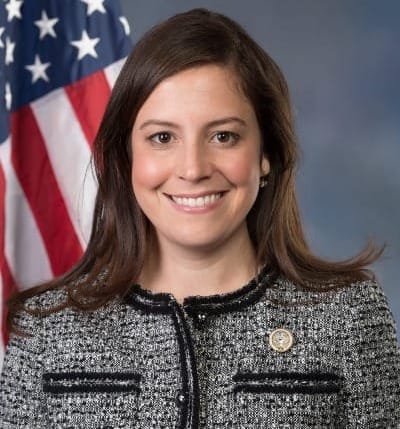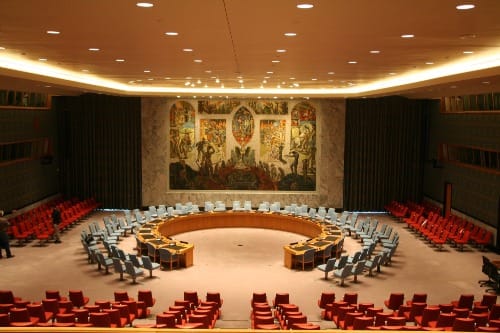Loyalty First, Diplomacy Second: Trump’s Choice for the UN

Share
Donald Trump nominated Elise Stefanik, the Chair of the House Republican Conference, as his envoy to the United Nations.
The world of multilateral diplomacy was waiting to see who the president elect would appoint to the position because through his choice, an initial understanding can be formulated of how he intends to engage with both the UN itself, and with other governments throughout the multilateral landscape.
With the choice now in place, we can unpack the beginnings of how Trump will go about implementing his approach to international multilateral policy.
Ascending Stefanik: Loyalty, Ambition, and Strategy

Elise Stefanik, the youngest person ever elected to congress when she won her first seat, has risen through the ranks of the republican party since she first took office in 2015. Prior to her election to congress for New York’s 21st district, she worked at the Domestic Policy Council and in the office of the White House Chief of Staff.
Now in her fifth term since first taking office, she has proved herself to be a skilled operator, navigating the complex rivalries of the House of Representatives and assuming the office of Chair of the House Republican Conference in May 2021 (making her the fourth ranking Republican in Congress).
She had been hesitant to lean into supporting Trump early in his first run for presidency in 2016, where she balanced her support for him as the republican candidate with her opposition to some of his positions -including on foreign policy approaches to NATO, Russia, and Iraq. However, she proved to be rather Machiavellian, gradually increasing her support for Trump as his support base grew, bolstering her political career in the process.
She became one of his staunchest supporters, proving her loyalty when she opposed his impeachment in 2019 and again in 2021. She was also among 126 Republicans requesting that the Supreme Court of the U.S. overturn the results of the 2020 elections, casting doubt on the results of the elections in her public statements.
She served on multiple committees and congressional bodies throughout her terms, including the House Armed Services Committee (and its subcommittee on Intelligence, Emerging Threats, and Capabilities), the Committee on Education and Workforce, and the Permanent Select Committee on Intelligence. She also a prominent advocate of increased representation of women in congress and in the republican party, forming Elevate PAC in 2018 to empower Republican women to win congressional seats.
While it is worth noting that Stefanik is a supporter of Israel, and a recipient of the “Defender of Israel Award”, as well as a recipient of consistent campaign contributions from AIPAC, I believe that this point is over emphasized; it would be highly unlikely that any potential nominee for this position would hold positions opposing Israel given the political environment in the U.S., and the American strategy in the Middle East.
The Perfect Pick: Loyalty, Leverage, and The Spotlight

Her shrewd political maneuvering, adapting her approach to meet evolving power dynamics, propelled her rise through the Trump led republican ranks. Through her consistent and incremental support for Donald trump after her initial opposition to some of his policies, she garnered enough political favor to secure his endorsement for the position of Chair of the Republican Conference, reflecting his increasing approval of her political approach.
More importantly, his nomination for her as Chair of the Republican Conference, and his current nomination of her as the U.S. ambassador to the UN puts her in his debt, giving him considerable political leverage over her and reducing the potential for disagreement or resistance to his policies and instructions. Given this dynamic, she will execute his vision at the UN without question; this dual band of loyalty and indebtedness positions her as uniquely trustworthy from Trump’s point of view, and thus not requiring constant oversight.
Trump hailed her as a strong communicator, and her mirroring of Trump’s adversarial style is likely the reason behind this. Trump is critical of multilateral diplomacy in general and of the UN in particular. He is not seeking to make friends within the organization and will likely see her combative and potentially disruptive approach as a measure of success; unlike a seasoned diplomat, Stefanik will not be concerned with balanced negotiations but rather with pushing Trump’s agenda more forcefully.
Visibility is another factor. Stefanik has a high profile domestically, with hundreds of thousands of followers on social media, and a strong media presence. Her visibility and propensity for the spotlight means that when she implements Trump’s vision in the UN, coverage will be extensive and resonate strongly with U.S. audiences. She will however have to carefully manage this spotlight, and her skill in managing media attention without upstaging Trump will be an important factor in her longevity in the position.
Stefanik’s Mandate: Confrontation Over Compromise
For all her political expertise, Stefanik has limited foreign policy experience, and what exposure to foreign affairs she has had has been through either the defense or intelligence lenses (through her committee memberships), priming her further to adopt adversarial rather than cooperative approaches, reinforcing her already confrontational approach.
Her strong support for Israel is also expected to factor into her positions in the international body, as would be the case for any other U.S. ambassador. Her predecessors never shied from supporting Israel within the UN system, wielding the veto whenever necessary to preempt any actions against it. She was part of the congressional delegation that visited Israel earlier this year to voice support for Israel’s conduct in the war, and she questioned university presidents on the pro Palestine campus protests held over the course of this year.
She is also vocal in her support for harsher sanctions on Iran, and more aggressive U.S. actions toward it, voicing that in her calls for a “maximum pressure campaign” under Trump’s leadership. This appears to be a mirroring of Trump’s approach, and a byproduct of her support for Israel rather than a seprate issue.
Her confrontational tone permeates her approach to China as well, which she recently accused of being involved in a campaign of “adversarial foreign influence” on university campuses in the U.S., in a statement released in October of this year.
As for the UN itself, Stefanik is vocal in her approach to defund programs that the U.S. find distasteful, particularly UNRWA, a view that could extend to other programs. Like her mentor, she adopts the perspective of forcing issues through aggressive rather than cooperative approaches, including through the threat of withdrawing financial support as a means to achieve required goals.
The general pattern expected therefore is one of confrontation. Confrontation with rivals, of countries that disagree with the U.S., with the UN system in general and with whatever is likely to highlight to the U.S. domestic audience that the government is adopting an approach of strength and differentiating from the Biden administration’s more nuanced approach.
As someone who received Trump’s endorsement not once, but twice, once for the Chair of the House Republican Conference and now for the post of ambassador to the UN, she will have considerable freedom of action. Her only limitations will likely be those of not outshining the master, and not actually stirring up enough blowback that causes regression of U.S. positioning within the international system.
An element that is often overlooked is her background is her advocacy for the role of women in the Republican Party, and how this may translate into her agenda at the UN. Given her background in promoting and supporting the election efforts of women in Congress, it is likely that she will bring this focus with her to the UN and wield the issue of women’s rights as one of the hammers that she will leverage against rivals within the body.
Of course, her lack of direct experience at the UN means an initial adjustment period is expected, during which the U.S. permanent mission might attempt to moderate her approach to certain issues. Trump’s preference for a like-minded representative ensures that Stefanik will enact his policies without challenging his worldview. Her visibility also suggests some of her actions will be aimed at appealing to American audiences, potentially shaping her engagements to align with domestic perceptions.
Stefanik at the UN: Diplomatic Ripples
Stefanik’s appointment aligns with expectations of a Trump-led nomination. Her loyalty to Trump, and her mirroring of his approach both fall well within the expected parameters for his ambassadorial nomination to the UN.
As such, her nomination does not pose unexpected challenges; while her disruptive potential is apparent, and questions remain about its impact on the role of the U.S. within the organization for the coming years, and whether it will be an overtly destructive one or merely obstructive, she does not present an unknown quantity.
Despite the concerns as to what exactly her mandate will be, and how much free reign she will be granted in operating in the UN, and exactly to what lengths Trump’s administration will go to distance itself from the previous one, this predictability makes her appointment more navigable for allies and rivals alike.
Rival countries in fact may see this as an opportunity. To have a U.S. permanent representative with barely contained disdain for the international system, and who may bring an increasingly confrontational approach to the multilateral forum, would present an opportunity to highlight the need for changes in the global system and question U.S. leadership.
If her permanent mission fails to reign her in, allowing for excessively combative engagements to recur, the U.S. may find itself increasingly isolated within an ecosystem that is increasingly apprehensive of an obstructive U.S. under Trump.
Repeated U.S. threats to reduce funding to the UN may also create a void, given that the U.S. is the biggest contributor to the UN budget. That void could lead into one of two directions, either the further weakening of the already embattled organization, or presenting others an entryway to further their influence. It is unlikely that the U.S. will permanently reduce its contributions to the UN budget -at least in the short term- given the leverage that it provides, but the repeated threats and nonpayment of obligations could serve to illustrate the unreliability of the U.S. as a global leader in the multilateral system.
Given her history of impulsive reactions, other delegations might attempt to provoke Stefanik to showcase U.S. volatility. Some may try a charm approach, aware that her direct line to Trump grants her considerable influence. Others may seek to avoid provoking her entirely, aware that Stefanik is known for her capacity to retaliate against real or perceived slights. Certain delegations may instead attempt to “wait her out,” expecting that her role could be temporary.
A more experienced diplomat as a nomination might have posed a challenge for Trump, potentially resisting Trump’s preferred approach and bogging down his vision with a nuanced diplomatic mindset. By choosing Stefanik, Trump avoids this issue entirely. Her strong pro-Israel stance, shared by many in the U.S., won’t raise concerns but rather reinforces the administration’s expected positions. Compared to past U.S. ambassadors with foreign policy expertise, Stefanik may be a relief to some rivals, as her influence may be viewed as less sophisticated and predictable.
Metrics of Success: Visibility, Confrontation, and Loyalty
For Trump, success metrics for Stefanik’s role will likely differ from traditional diplomatic measures. Instead, her role will focus on visible outcomes that play well with Trump’s domestic base, reinforcing his image as a leader intent on restoring American strength. Success will likely hinge on her ability to secure symbolic victories—whether through confrontations or high-profile moments—that can be broadcast at home as evidence of a “revived” U.S. presence on the global stage.
Visibility will be another metric of her effectiveness. Trump chose Stefanik for her media-savvy communication skills. Her confrontations with rival states, if managed effectively, could be used as domestic proof that Trump’s administration is unafraid to challenge foreign critics or disrupt the status quo in favor of national interests. Trump may even welcome negative reactions from adversarial states and UN members, interpreting them as evidence of Stefanik’s commitment to putting American interests first, regardless of multilateral opposition.
Her success will also be measured by her capacity to hold a strong, visible stance on issues like Israel and sanctions against countries like Iran. Ultimately, as long as she can embody Trump’s assertive, disruptive approach and maintain the high-profile visibility he prizes, he will deem her tenure at the UN effective, even if traditional diplomatic achievements are few and far between.
Trump’s UN Bet

In essence, Stefanik’s appointment is emblematic of Trump’s approach to selecting loyalists who bring media visibility and ideological alignment rather than conventional diplomatic credentials. Her nomination reflects Trump’s intention to use the UN role not as a platform for advancing multilateral engagement but as a stage to reinforce his “America First” narrative back home. By choosing someone with a known profile and media skillset, Trump signals that the primary purpose of the UN appointment will be to bolster domestic support and send strong, uncompromising messages to both allies and adversaries.
Stefanik’s role at the UN will likely be shaped by her ability to confront rather than compromise, to leverage her position as a tool for political visibility, and to further Trump’s objectives on the global stage while keeping her actions aligned with U.S. public opinion. Her high visibility and outspoken loyalty to Trump are not just strategic but integral to this approach, providing a way to transform UN representation into a force that primarily serves Trump’s domestic political agenda. By aligning her profile with these aims, Trump ensures that her tenure will reinforce his vision of a strong, assertive America, albeit one more focused on image and influence than traditional diplomacy.

